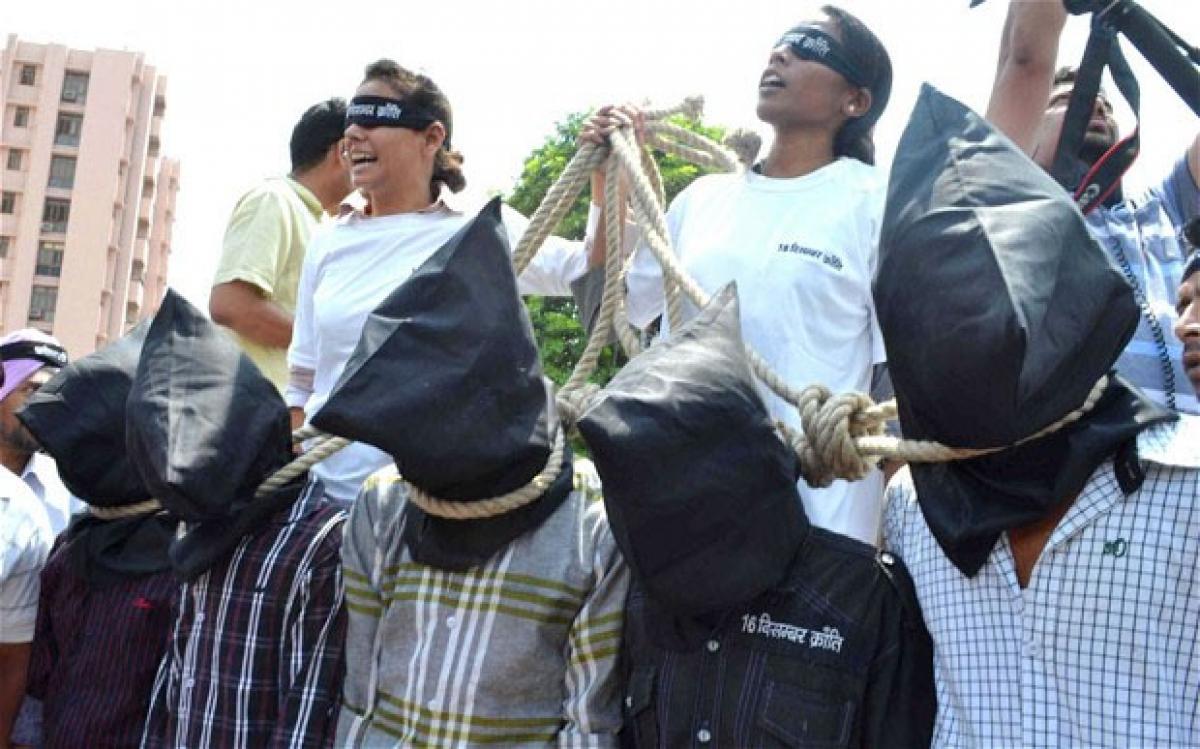Live
- Immunization Workshop Conducted with WHO Collaboration
- Government Will Procure Every Grain Grown by Farmers - MLC Kuchukulla Damodar Reddy
- Nagar Kurnool MLA Dr. Kuchukulla Rajesh Reddy Campaigns in Maharashtra Elections
- Intermediate Students Must Pay Exam Fee for Annual Exams - DIEO G.Venkataramana
- Comprehensive Arrangements in Place for Group-3 Exams in Nagarkurnool District
- Survey Teams Must Inform Homeowners in Advance: Collector Badavath Santosh
- Moscow pledges response to US missile defence base in Poland
- Stamp on Jain Muni Released in Hombuja Jain temple in Shivamogga
- Moldova enshrines EU integration in constitution
- Three child rapists executed in China
Just In

x
Highlights
A death sentence – such as the one handed to Yakub Memon, lone convict of the 1993 Mumbai serial bombings – is common in India, with 1,303 such verdicts between 2004 and 2013, according to this National Crime Record Bureau (NCRB) prison statistics report.
A death sentence – such as the one handed to Yakub Memon, lone convict of the 1993 Mumbai serial bombings – is common in India, with 1,303 such verdicts between 2004 and 2013, according to this National Crime Record Bureau (NCRB) prison statistics report.
.jpg)
However, only three convicts were executed over this period, one each in West Bengal (2004), Maharashtra (2012) and Delhi (2013). India saw an execution-free period of seven years between 2004 and 2012.
On August 14 2004, Dhananjoy Chatterjee was hanged at Alipore Central Jail in West Bengal on his 42nd birthday, convicted for the rape and murder of a teenage girl.
On November 21 2012, Mohammad Ajmal Amir Kasab the only terrorist to have survived the 2008 Mumbai terror attacks, was hanged in Pune’s Yerwada Jail.
On Februrary 9, 2013, Mohammed Afzal Guru, a convict in the 2001 parliament attack case, was hanged inside Delhi’s Tihar Jail.
In addition, 3,751 death sentences were commuted to life imprisonment during this period.
Former chartered accountant Memon is set to be hanged on July 30 2015, the day he turns 53. A debate has now broken out over the verdict against him and the death sentence in general.
In July 2007, Yakub and 11 others were convicted and sentenced to death by a special court for planning or carrying out the 1993 Mumbai bombings that killed nearly 260 people and injured 700.
In March 2013, the Supreme Court upheld Memon’s death sentence, while commuting the death sentence of 10 others (one died later) to life imprisonment.
On social media, a raging debate with dubious data
Bharatiya Janata Party (BJP) leader Subramanian Swamy – reacting to assertions that only Muslims were being hanged – recently said that 170 people have been hanged in India after 1947 with only 15 of them Muslims, according to Asian News International (ANI).
Since independence, at least 60 Muslim (according to their surnames) convicts were hanged, according to the Death Penalty Research Report by National Law University, Delhi.
The report compiled data from central prisons but is not an exhaustive list because many states did not provide complete information. Some states provided such reasons: the Kerala and Andhra Pradesh authorities said termites destroyed records.
The 35th Law Commission report, released in 1967, said more than 1,400 prisoners were executed from 1953 to 1963 but does not give religion-wise details of hanged convicts.
2007: Year of death sentences
The most death sentences were awarded in 2007 (186), followed by 164 in 2005. That year—2005—1,241 death sentences were commuted to life imprisonment, the most ever.
Uttar Pradesh awarded the most death sentences (318) over the last 10 years. Maharashtra was second with 108, followed by Karnataka (107), Bihar (105) and Madhya Pradesh (104).
These top five states comprise almost 57 percent of all capital punishments awarded in the country between 2004 and 2013.
In Delhi, 2,465 prisoners had death sentences commuted to life imprisonment (between 2004 and 2013). Jharkhand and Uttar Pradesh were second with 303 death sentences commuted to life imprisonment, followed by Bihar (157) and West Bengal (104).
Delhi alone accounted for nearly 66 percent of all prisoners whose death sentence was commuted to life imprisonment between 2004 and 2013.
Death sentence abandoned by 160 countries – not India, China, the US and Japan
About 160 countries have abolished the death penalty in law or practice while 98 have abolished it altogether, according to a United Nations report.
In 2007, the United Nations General Assembly adopted a resolution towards the abolition of capital punishment and the protection of human rights when it endorsed a call for a worldwide moratorium on the death penalty.
Apart from India, other prominent countries that opposed the resolution included China, Japan and the United States.
In 2013, nearly 778 executions were reported in 22 countries, a 14 percent growth over 682 executions in 2012.
On Monday, Pakistan executed two murder convicts following a one-month break during the holy month of Ramadan. This adds to 176 executions since December 2014, after a six-year moratorium on the death penalty.
(In arrangement with IndiaSpend.org, a data-driven, non-profit, public interest journalism platform. Chaitanya Mallapur & Devanik Saha can be contacted at [email protected]. The views expressed are personal)

Next Story
More Stories
ADVERTISEMENT
© 2024 Hyderabad Media House Limited/The Hans India. All rights reserved. Powered by hocalwire.com







